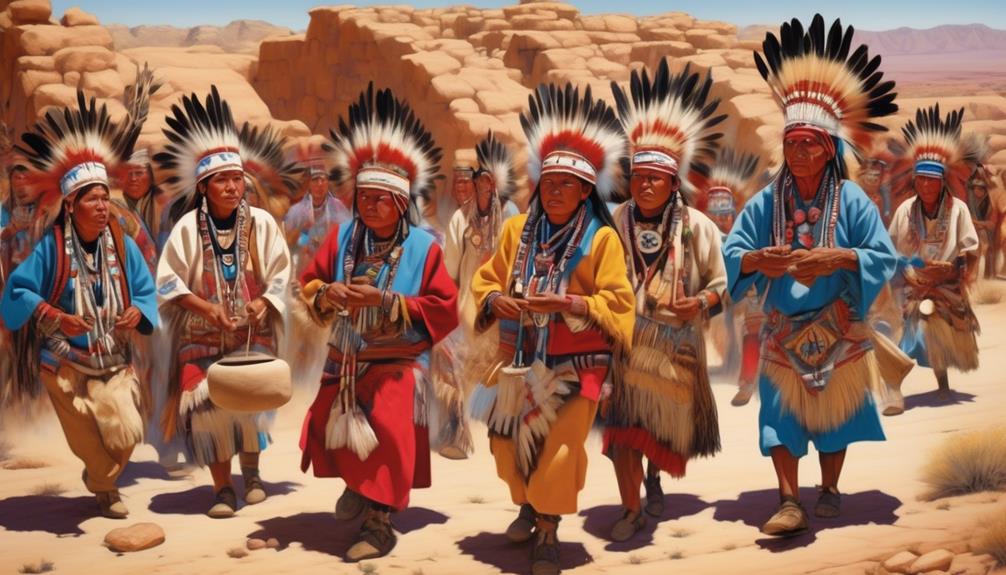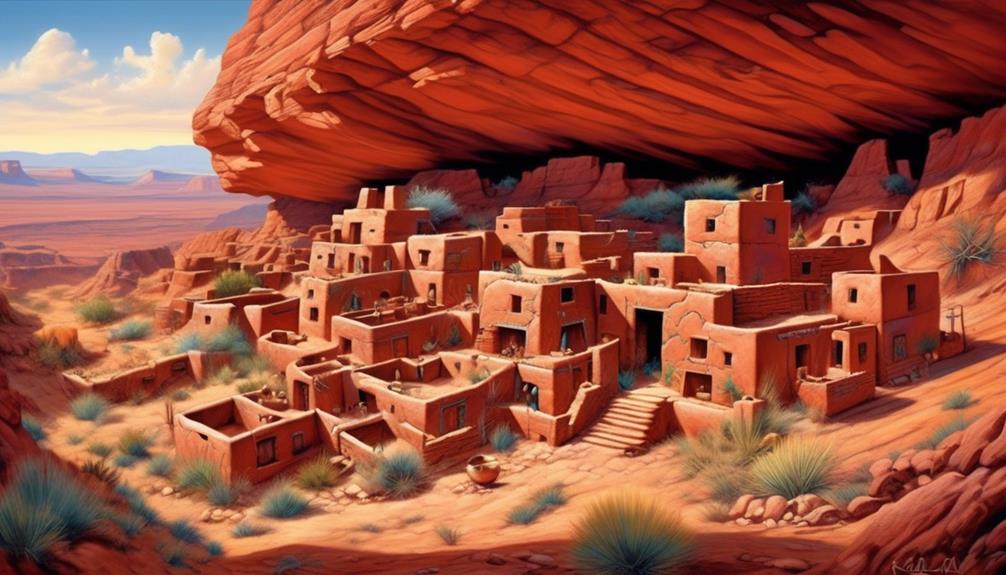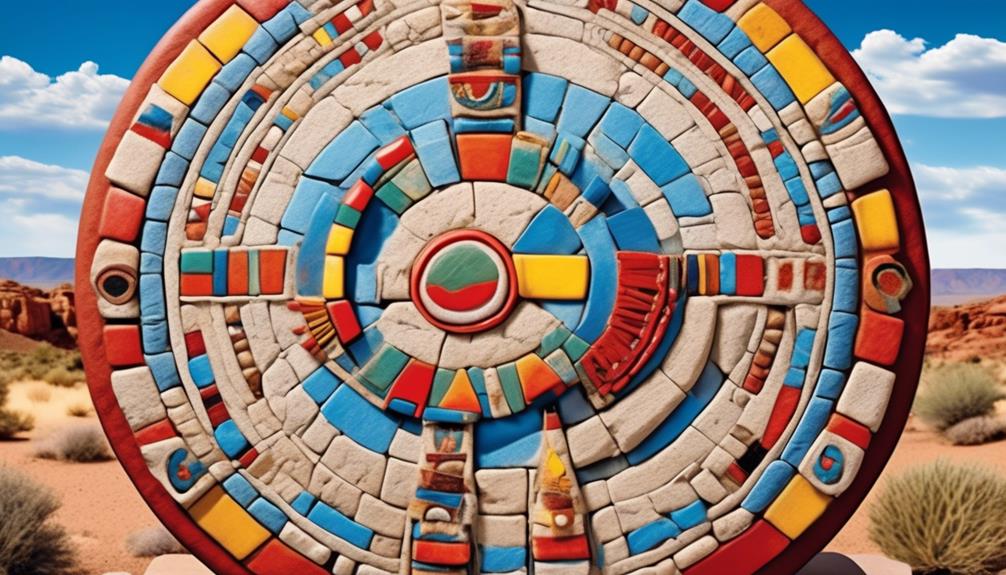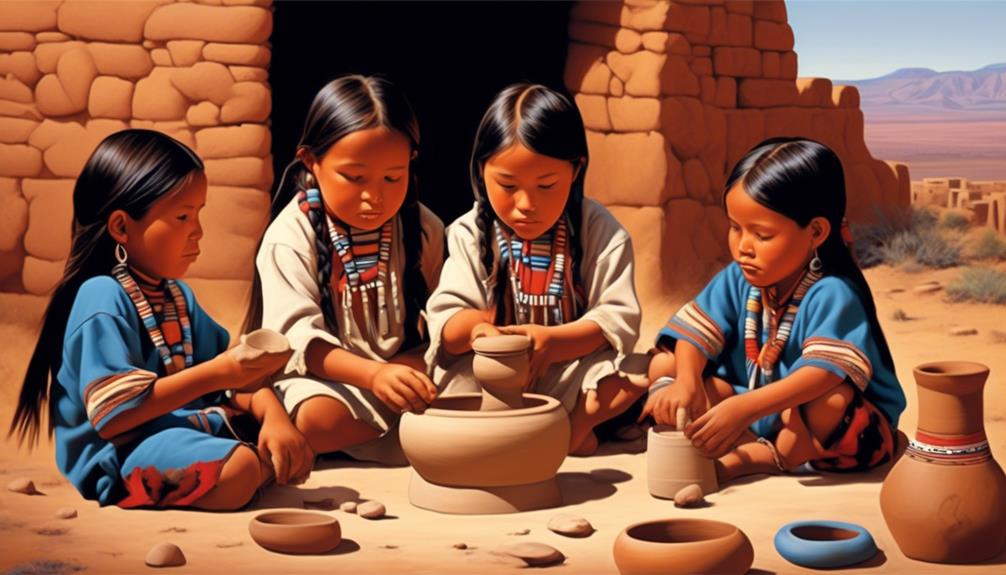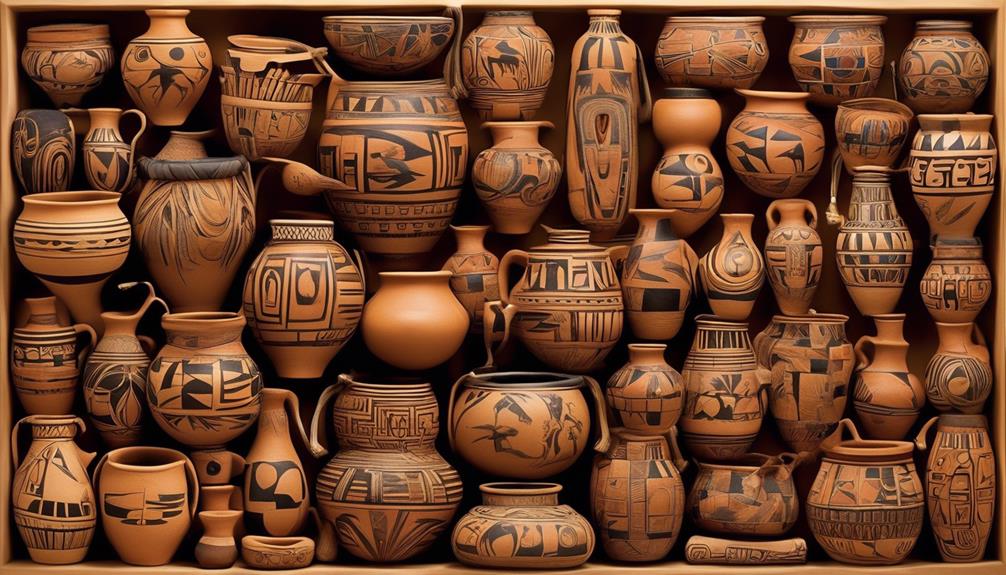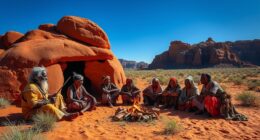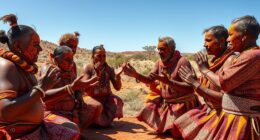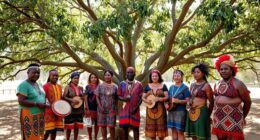On the historic red soil of the Hopi reservation, it feels as though the voices of the ancestors reverberate through the canyons, passing down the wisdom of past generations. Presently, the Hopi Tribe is delicately managing the conservation of their vibrant cultural legacy while also embracing the changes of contemporary society.
Their traditional practices and ceremonies provide a glimpse into a way of life that has endured for generations, yet contemporary challenges and adaptations have brought new complexities to their community structure and social organization.
The Hopi people have also become renowned for their commitment to environmental stewardship and sustainability, drawing global attention to their unique way of life.
Key Takeaways
- The Hopi Tribe places a strong emphasis on cultural preservation through rituals, storytelling, and art, as well as a deep sense of pride and reverence for their ancestry.
- The tribe maintains traditional practices and ceremonies as a living expression of their rich heritage, acting as a bridge between the past and the present and fostering a deep sense of community and interconnectedness.
- The Hopi Tribe faces contemporary challenges in balancing economic development with cultural preservation, but they are actively working to diversify livelihoods, revitalize traditions, and strengthen their community for resilience.
- Environmental stewardship and sustainability are important values for the Hopi Tribe, as they commit to renewable energy, eco-friendly agricultural practices, and harmonizing modern needs with the preservation of their natural surroundings.
Historical Background of the Hopi Tribe
The history of the Hopi Tribe is a rich tapestry woven with ancient traditions, enduring resilience, and a deep connection to the land. Cultural preservation lies at the heart of the Hopi way of life. Through intricate rituals, storytelling, and art, the Hopi people have safeguarded their heritage for generations. This commitment to preserving their cultural identity reflects the tribe's deep sense of pride and reverence for their ancestry.
Tribal sovereignty is a cornerstone of the Hopi Tribe's history. Despite enduring external pressures and influences, the Hopi have tenaciously defended their right to self-governance and self-determination. This steadfast dedication to maintaining their autonomy has allowed the Hopi people to continue their traditions and uphold their spiritual beliefs without compromising their values.
Comparatively, the Hopi Tribe's historical background illuminates a narrative of unwavering dedication to their cultural heritage and the preservation of their tribal sovereignty. Their remarkable ability to adapt while steadfastly holding onto their traditions serves as a testament to their resilience and unwavering commitment to honor their ancestors.
Traditional Practices and Ceremonies
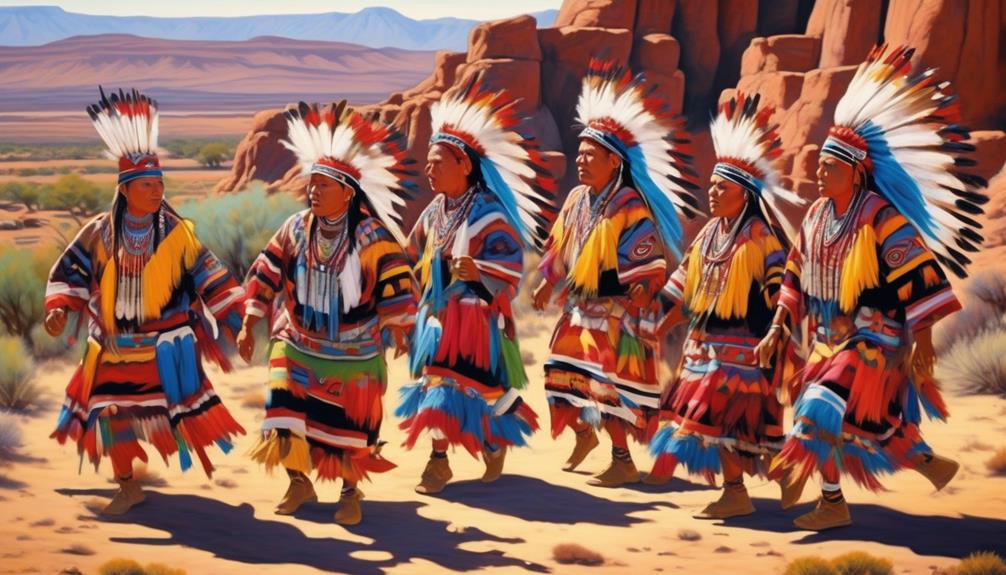
As we immerse ourselves in the vibrant tapestry of Hopi culture, the traditional practices and ceremonies emerge as living expressions of their rich heritage, interwoven with enduring rituals and a deep reverence for the land. Cultural preservation is at the heart of every ceremony, serving as a bridge between the past and the present. One can observe the spiritual significance of these practices in the way they're meticulously upheld, each one carrying the weight of centuries of tradition.
In witnessing the Hopi ceremonies, one can't help but be struck by the deep sense of community and interconnectedness they foster. The ceremonies serve as a unifying force, bringing together the Hopi people in a shared expression of their values and beliefs. The intricate dances, songs, and rituals speak to a profound connection with the land and the ancestral spirits, highlighting the enduring bond between the Hopi and their environment.
Comparatively, the ceremonies also reveal a timeless wisdom, offering insights into sustainable living and harmonious coexistence with nature. Through their traditional practices, the Hopi continue to inspire a deep respect for the earth, reminding us of the importance of preserving our cultural and spiritual heritage for future generations.
Contemporary Challenges and Adaptations
Amidst the rapidly changing landscape of the modern world, we find the Hopi Tribe grappling with contemporary challenges and making adaptations to preserve their cultural heritage. The Hopi people, like many indigenous communities, are facing the complex task of balancing economic development with cultural preservation. This delicate equilibrium requires innovative solutions and a deep understanding of their traditions.
| Challenges | Adaptations | Impact |
|---|---|---|
| Economic Development | Diversifying livelihoods | Sustainable growth |
| Cultural Preservation | Revitalizing traditions | Maintaining identity |
| Access to Resources | Strengthening community | Fostering resilience |
Economic development poses a significant challenge as the Hopi Tribe seeks to create opportunities for its people while safeguarding its cultural values. Diversifying livelihoods through sustainable initiatives such as ecotourism and traditional craftsmanship allows for economic growth without compromising heritage. Simultaneously, maintaining cultural preservation by revitalizing traditions and strengthening community ties ensures that the Hopi people continue to thrive amidst modern challenges. Access to resources is crucial in fostering resilience and adapting to the ever-changing world, and the Hopi Tribe is actively engaging in these efforts to sustain their way of life for future generations.
Community Structure and Social Organization
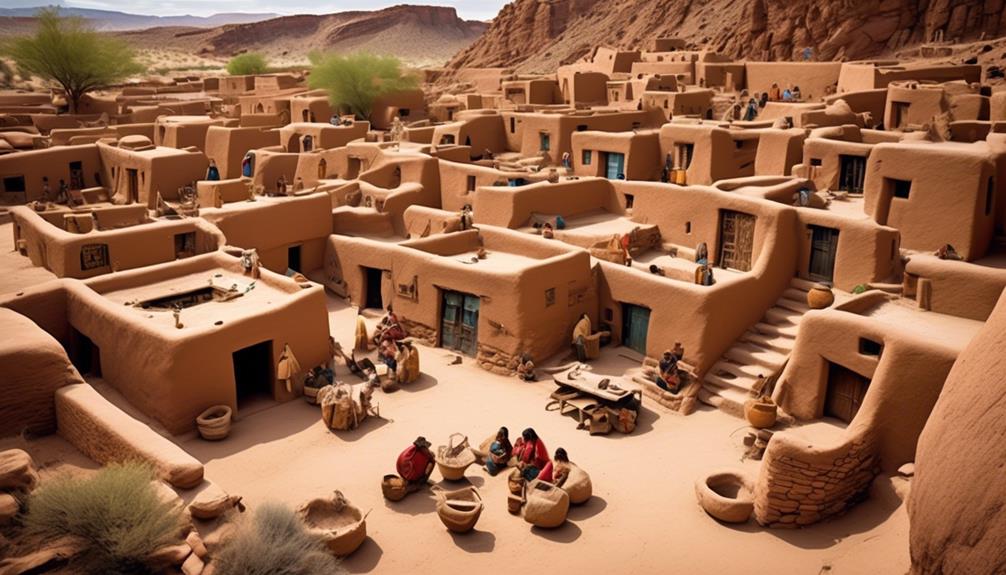
How do the Hopi Tribe's community structure and social organization reflect their cultural values and historical traditions?
The Hopi Tribe's community structure and social organization are deeply rooted in their cultural values and historical traditions, shaping their way of life and interactions with one another.
- Community Leadership: The Hopi Tribe places great emphasis on communal decision-making and consensus-building, with leaders chosen based on wisdom, experience, and their dedication to preserving traditional practices.
- Kinship Ties: The Hopi people maintain strong kinship ties, with extended families often residing in close proximity. This fosters a sense of unity and support within the community, reinforcing their shared values and responsibilities.
- Ceremonial Practices: Ceremonial activities play a central role in the community's social organization, serving as occasions for spiritual connection and cultural preservation.
- Inter-generational Knowledge Transfer: The Tribe places significant importance on passing down traditional knowledge and skills from one generation to the next, ensuring the continuity of their cultural practices and values.
- Collective Responsibility: The concept of collective responsibility is deeply ingrained in the community's social organization, with members working together to address challenges and celebrate achievements, reflecting their interconnectedness and mutual support.
Environmental Stewardship and Sustainability
We, the Hopi Tribe, prioritize environmental stewardship and sustainability as integral components of our cultural identity and interconnected way of life.
Our commitment to renewable energy and conservation is deeply rooted in our respect for the earth and our responsibility to future generations. We harness the power of the sun through solar panels and actively seek opportunities to expand the use of wind energy, reducing our reliance on non-renewable resources.
By implementing eco-friendly agricultural practices and sustainable land management, we honor our ancestors' wisdom and ensure the fertility of our soil for years to come. We cultivate traditional crops using organic methods, preserving the natural balance of our ecosystem and minimizing environmental impact.
Our approach to land management integrates modern knowledge with age-old traditions, promoting biodiversity and resilience. As stewards of the earth, we strive to harmonize our modern needs with the preservation of our natural surroundings, walking the path of sustainability and safeguarding the precious gifts of our land for the benefit of all.
Frequently Asked Questions
How Has Modern Technology Impacted the Daily Lives of the Hopi People?
Modern technology has significantly impacted our daily lives, altering the way we carry out traditional practices. The impact of technology is evident in how we communicate, work, and engage in cultural activities.
While it has brought convenience and efficiency, it has also challenged us to find a balance between embracing modern tools and preserving our cultural heritage. We've had to adapt and integrate technology in ways that align with our values and traditions.
What Are Some Common Misconceptions About the Hopi Tribe and Their Way of Life?
Many misconceptions surround the Hopi Tribe's traditions and way of life. Misunderstood traditions are often mistaken for outdated practices, but they're crucial for cultural preservation.
One common misconception is that the Hopi people are resistant to change, when in fact they've adapted to modern life while maintaining their rich heritage. It's a delicate balance, like tending to a fragile garden, where respecting the past is just as important as embracing the future.
How Do the Hopi People Balance Preserving Their Traditions With Integrating Into Modern Society?
Preserving traditions while integrating into modern society requires a delicate balance. We face the challenge of maintaining our cultural identity while adapting to societal changes.
It involves actively passing down our customs and values while finding ways to participate in the modern world. We navigate this by seeking harmony between the old and the new, honoring our heritage while embracing opportunities for growth and connection with the broader community.
What Role Do Women Play in the Leadership and Decision-Making Processes Within the Hopi Community?
Women's leadership within the Hopi community is central to decision-making processes and community involvement. Gender roles are interconnected with cultural traditions and social dynamics, shaping women's influence and decision-making power.
Women play a significant role in guiding the community, contributing to a balanced and inclusive decision-making process. Their leadership reflects a deep understanding of the community's needs and aspirations, enriching the overall governance with diverse perspectives.
How Does the Hopi Tribe Approach Healthcare and Wellness in the Modern World?
In our modern world, the Hopi tribe approaches healthcare and wellness with a deep emphasis on holistic wellness and traditional remedies. We prioritize community health through preventive care, acknowledging the interconnectedness of body, mind, and spirit.
One statistic that stands out is that over 85% of Hopi households incorporate traditional healing practices into their wellness routines, showcasing a commitment to preserving our ancient wisdom in promoting overall well-being.
Conclusion
As we look at the Hopi tribe today, we see a community deeply rooted in tradition yet adapting to modern challenges.
Like a sturdy oak tree, they stand tall against the winds of change, preserving their customs and ceremonies while embracing sustainability and community unity.
Their history is a tapestry of resilience and perseverance, and their future holds the promise of continued strength and cultural vitality.
